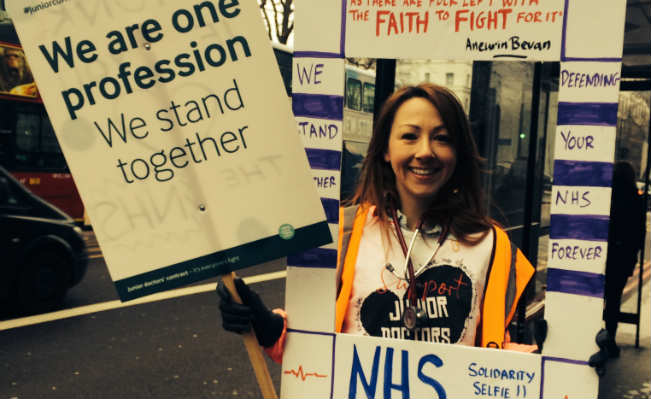 Junior doctor on strike outside University College Hospital. Photo: Feyzi Ismail
Junior doctor on strike outside University College Hospital. Photo: Feyzi Ismail
Junior doctor Mona Kamal explains why it’s vital that doctors keep up their action, and why the public needs to rally to their defence
After the negotiations for a proposed junior doctors’ contract broke down late last year, Jeremy Hunt has repeatedly threatened us with forcible imposition and, last week, immediately after the second inspiring and undeniably successful day of industrial action, he went ahead with this self-proclaimed ‘nuclear option’.
In doing so Jeremy Hunt has wilfully ignored months of vehement opposition, which united medics and allied health professionals alike and mobilised vast swathes of doctors, many of whom were previously unfamiliar with political activism. He is knowingly sabotaging NHS workers by disregarding our concerns about patient safety and threatens to destabilise the service – all as a pretext to selling it off. In fact, this imposed contract appears to be a crucial step in the wider process of NHS privatisation.
There is no doubt this government is engaged in what is an ideologically driven campaign to dismantle the welfare state. They are after the NHS in particular for its symbolic value and crucially to transform it into a system better serving private sector interests. This now includes gifting private companies with cheap labour, enabling the lucrative routine procedures to be carried out at weekends by cut price junior doctors employed by the NHS.
The arguments for how this contract threatens patient safety have been made. Doctors, however, with some notable exceptions, have been less inclined to talk about its relationship to privatisation and its place in the wider context of Tory austerity. This is the argument we need to be utilising as we confront the government over this contract, and one we must be making clear to the public.
The BMA has been anxious of making these links for fear of ‘politicising’ the debate, preferring instead to address the contract in isolation. But we can no longer afford to do this. This struggle has never been purely about unfair contracts for doctors; it is about the future of the NHS, the threat posed by this government to the existence of a publicly owned, equitable health service and the principles of universalism on which it was built. This is what we must be fighting to safeguard, and the BMA cannot shy away from saying this.
It has been reported in the right-wing press that this unworkable contract may succeed in its aim of weakening doctors’ allegiance to the NHS, prompting a mass exodus (good news for Australia but potentially catastrophic for our service, which already struggles to retain staff). However, the opposite is true. The prevailing mood amongst junior doctors remains resolute and we realise the strength of our position.
Firstly, our mandate for full strike action, which we will use as and when necessary, remains. We have the crucial support of consultant colleagues who will help minimise the disruption to patients. Secondly, the overwhelming majority of the public is on our side. The level of support and good will that we have enjoyed (unimaginable in most public sector strikes) has boosted our confidence and suggests that the arguments are getting through. So we have a mandate for industrial action, the support of the public and the mood is unmistakably to stay and fight the imposition. The BMA can no longer do this alone.
The BMA has done well to unite doctors, but it now needs to engage with the wider trade union and labour movement as well as anti-austerity campaign groups. We must see this not as an isolated threat to doctors’ pay but a politically motivated ideological attack taking place within the wider context of Tory austerity. These groups are looking to the BMA to begin making these arguments and will readily stand with us when we do. Likewise we would also call on the Labour Party which, whilst being largely supportive of junior doctors, is yet to address our dispute within the context of the wider political issue of privatisation. They also need to communicate these concerns to the public.
This government’s austerity drive threatens working conditions across the entire public sector. Contextualising our dispute in this way and working alongside other trade unions and the anti-austerity movement will not dilute our argument, it will strengthen it. It is only by doing so that we will have the means to resist these attacks effectively and keep our services running in the interest of all.
Emergency Rally: Not without a fight, Save our NHS. No to imposition
Wednesday, 17 February, 18:30, Conway Hall
Organised by the People’s Assembly Against Austerity
Book tickets online.

